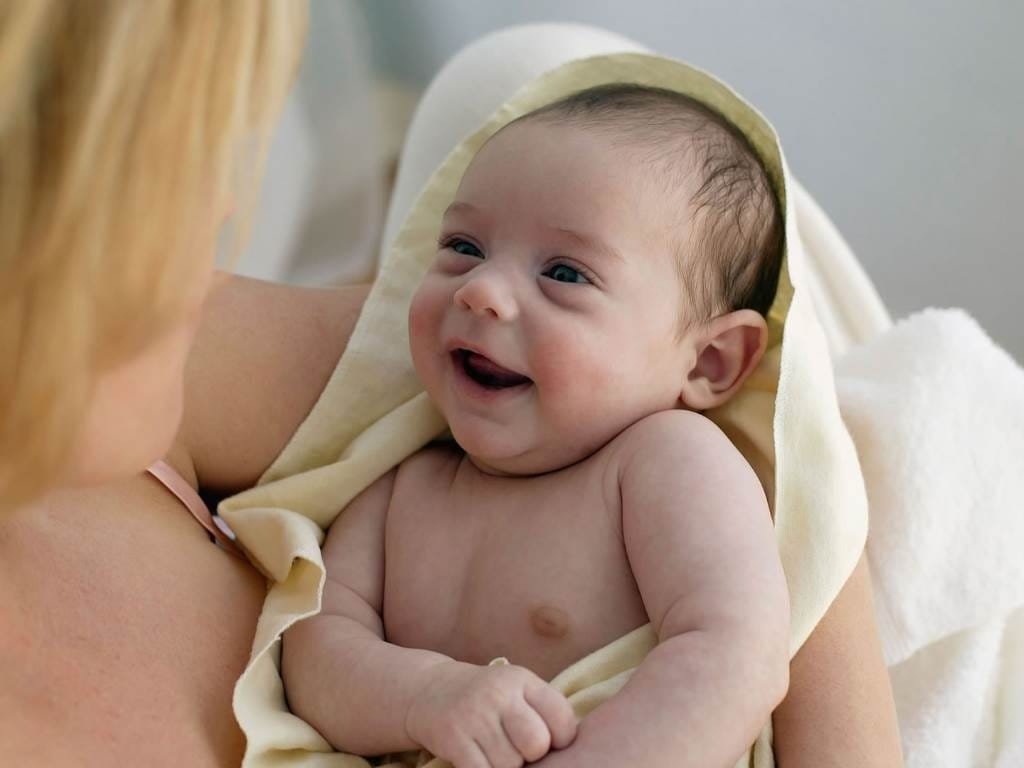First 12 Weeks of Your Newborn Baby
We talk about babies being fully formed at birth, but of course there are still many phases of growth for them to go through, physically, mentally, and emotionally. When you look back in three months at photographs of your baby on the day he was born, you’ll barely be able to believe how that tiny, wrinkled, curled-up bundle could become the bouncing, smiling, laughing, grasping, and inquisitive little person you hold now.
1 Week Old
Your baby will spend time curled up as he adjusts to life outside the uterus. His fists will remain clenched for much of the time.
What you can do: Get your baby to look in a mirror—he loves looking at faces and will seek out yours immediately after birth.
2 Weeks Old
Your baby may now be able to hold his head up for a few seconds when held to your shoulder.
What you can do: Entertain your baby by making faces and sticking out your tongue. He will try to mimic you.
3 Weeks Old
You may notice that your baby’s movements are less jerky and more controlled. He is gaining control of his muscles Some of his early reflexes are starting to fade.
What you can do: While your days and nights remain a bit chaotic, you can assist your baby in distinguishing between them by dimming his room at night to establish a nighttime routine.
4 Weeks Old
At four weeks, your baby’s neck muscles are getting stronger, and you might observe him holding his head up for a bit longer when supported on you.
What you can do: Place your baby on his tummy; he will try to lift his head up from the surface. This helps him build more strength in his back and neck.
5 Weeks Old
Your baby can now focus both eyes and is working his eye muscles hard to focus on objects near and far. He can track a moving object from the side of his vision until it is in front of him.
What you can do: Young babies love black-and white patterns. Try placing some where your baby can look at them while he is lying down.
6 Weeks Old
At around six weeks you will see something that makes all the hard work worthwhile: your baby’s first smile. He is becoming more socially aware and responds to your voice, holding your gaze when you speak.
What you can do: Talk to your baby, it will help him develop his language skills even though he can’t respond with words. You may even get a few throaty noises in reply.
Did You Know
- 8–10 inches (20–25 cm) is the distance your baby can focus on at two Weeks Old.
- 4 weeks At four weeks your baby will be less curled up than after birth.
- 10 days The umbilical cord usually comes off naturally 10 days after birth.
- 14–18 The number of hours that your baby will sleep during a 24-hour period.
- 6 million There are some six million cells on every square centimeter of a newborn’s skin.
- 4 reflexes Your newborn baby has four natural reflexes at birth: startle, rooting, grasping, and stepping.
7 Weeks Old
Your baby is beginning to discover his hands, you may notice him gazing at them and moving his fingers. This is the start of hand-eye coordination. He may bring his hands toward his mouth to explore them. His eye muscles have developed enough so that his eyes can now move in unison. Cooing and gurgling can start around now, as your baby realizes that he has a voice!.
What you can do: Try dangling objects over him— just within swiping reach—as he lies on his back.
8 Weeks Old
Your baby’s back and neck muscles are now strong enough for him to hold his head in the midline of his body when he is lying on his back. Try holding your baby under his armpits and letting him bat his feet against the floor. Some babies are able to bear a little weight on their legs at this stage.
What you can do: Give your baby plenty of space to move, stretch out, and build strength in those growing muscles.
9 Weeks Old
Your baby is becoming more social. He recognizes his parents and to the attention you give him. He is beginning to associate people with fun and playtime.
What you can do: Your baby already loves your voice, but try using varied tones and interesting facial expressions. Copy your baby’s coos to help him learn that the art of conversation is better with two!
10 Weeks Old
The ability to calm and soothe himself is an important skill for your baby to learn and it may be developing by around 10 weeks. You may notice that your baby can cope with higher levels of stimulation. He may have figured out how to bring his hands together in front of his face or body.
What you can do: Sing nursery rhymes to your baby. He’ll be transfixed by the rhythm and the stanzas will help him begin to understand the complexities of language and speech.
11 Weeks Old
Your baby is beginning to recognize objects, such as his bottle or the movements you make to prepare for breastfeeding, and will show signs of eagerness to feed. He is also able to connect sounds with the object that makes them.
What you can do: Try making a sensory box filled with items of different colors and textures that can make different sounds, such as crinkly paper, rustling foil, and rattles. Put them in your baby’s hands so that he can explore them.
12 Weeks Old
By now, your baby is really starting to communicate with you. You may hear coos, squeals, and even a little babbling. Your baby may start reaching out to grab things with intent, rather than simply grasping what’s handed to him. Your baby’s digestive system is fully matured now. Your baby’s giggles begin around now—a sure sign that he thinks you’re funny!
What you can do: Try incorporating gentle movement with nursery rhymes.










